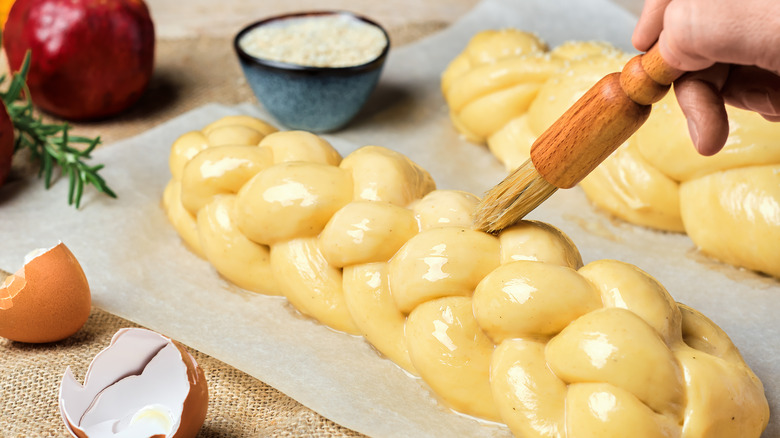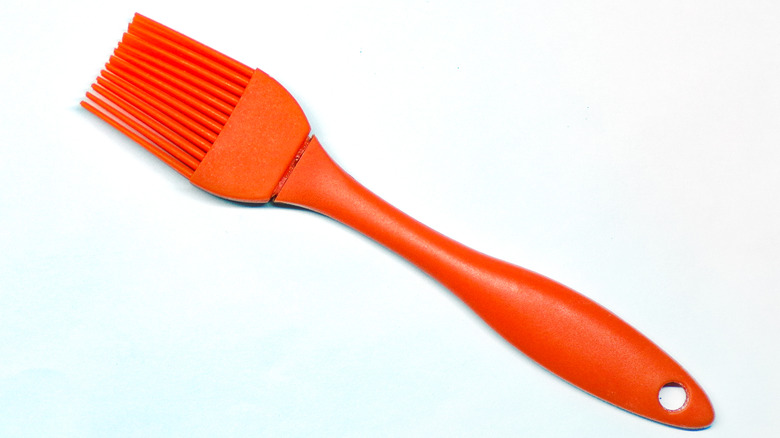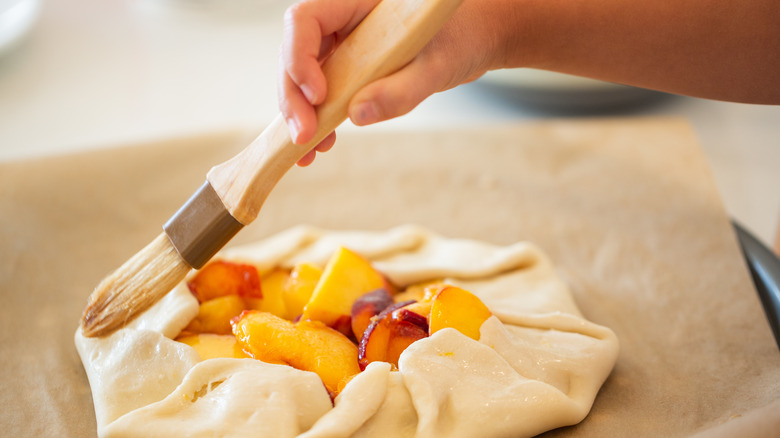Here's What A Good Pastry Brush Should Be Made Of
We may receive a commission on purchases made from links.
A pastry brush is so much more than meets the eye. Webstaurant Store explains that there's no better tool for applying liquid to the surface of food. For example, they are perfect for adding an egg wash to challah, for greasing a pan, or for brushing excess flour off of croissant dough. They can also be used for many other kitchen tasks, like brushing a cake free of crumbs, or the dirt off of a mushroom, wiping down the side of a pan of caramel, or basting a rack of ribs.
Moreover, the options for this simple tool are seemingly endless. America's Test Kitchen has a list of attributes to look for when selecting a pastry brush. The bristles need to be uniformly trimmed to just shy of 2 inches in length and should be packed into a dense 1 1/2-inch thick head. The handle needs to offer a firm grip and should be around 5 inches long. Finally, those bristles need to stay in place. But, each of these takes a backseat to an even more important decision.
Natural or silicone bristles
The right type of bristle trumps any other trait for this essential baking tool. The most common choices are natural — usually boar's-hair — or synthetic. Synthetic bristles are available in a few materials but silicone is the most common, and popular version. In fact, Amazon's top five best-selling pastry brushes are made from silicone.
According to America's Test Kitchen, natural bristles are gentle and perfectly suited for thin layers of egg wash, applying butter, or brushing excess flour from a risen loaf of bread. But, with high heat, they can singe or become loose. And, strong odors will cling to these bristles.
Silicone bristles, on the other hand, can take high heat — some versions are safe up to 600 degrees Fahrenheit. They won't absorb odors, and can go in the dishwasher. But, they're not delicate tools. The large bristles can damage dough and leave trails on baked goods. Most importantly, according to BBC Good Food, liquids don't cling to silicone bristles, and whatever you are trying to apply tends to drip off unevenly.
It depends on the job
Silicone pastry brushes are taking some heat, with Food and Wine going so far as to call them a scam. Non-porous bristles are better suited for spreading than brushing. But, they are heat safe. So, if you need to evenly brush oil onto a hot pan, or baste some chicken thighs on the grill, a silicone brush still has its merits.
For every other pastry brush task, in the end, natural bristles are the best option. They're gentle, absorbent, and inexpensive. All of that makes up for the occasional boar's hair coming loose. Those are easy to pluck off. Keeping them clean is also an easy-to-solve issue. Food and Nutrition suggest using hot water to rinse away debris, gently applying some soap to the bristles, and rinsing well. Be sure not to pull or twist bristles as you blot them dry. Air drying on a flat surface will keep them in pristine shape for a long time.
They also offer some great advice for dealing with any lingering odors. Just buy two; one for sweets, like glazing and egg washing, and one for savory uses, like garlic oil or barbecue sauce.


